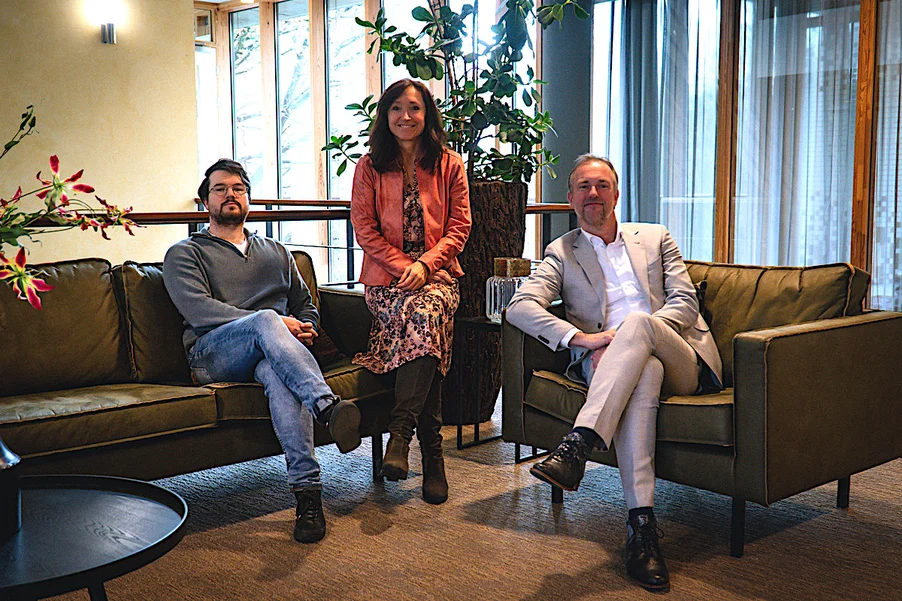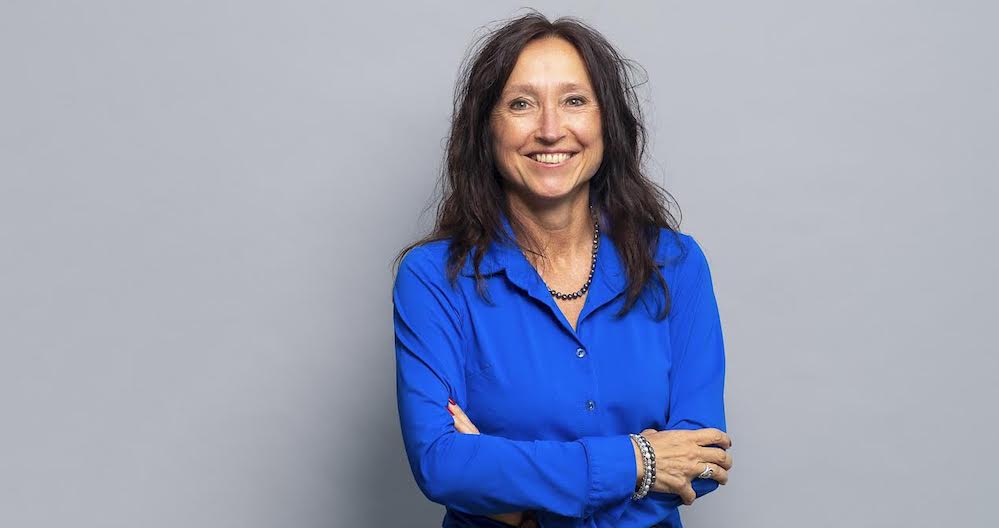(Editor’s note: This profile of Monika Hoekstra was first posted by Fe+male Tech Heroes. It’s reposted here with permission as part of our Tech Tuesdays series. Dispatches profiles expats in tech because so many of our highly skilled internationals are industry leaders.)
The person who leads one of the Netherlands’ most important tech innovation initiatives is not who you might imagine it would be. NXTGEN Hightech Program Director Monika Hoekstra is not a scientist or an engineer. Hoekstra is not a career bureaucrat. She was not born and raised in the Netherlands and she’s certainly not a man.

Hoekstra is a woman who’s proven herself as focused, disciplined, open-minded and driven. Competitive from an early age, Hoekstra is a great talker and a completely disarming personality.
At NXTGEN Hightech, she oversees a National Growth Fund program with a total investment of nearly 1 billion euros where, with 61 projects in six market domains, the next generation high tech equipment is being developed:
• Hands-free agricultural and food production
• Cleaner and attainable energy with batteries and electrolyzers
• Lab-on-chip/Organ-on-Chip equipment for animal-test-free pharma/medicine production
• Safer communication through light/laser
• Faster and more energy efficient chips
• Automated production of composites/light-weight material
The future of the Dutch economy is not in her hands, but together with more than 330 partners, she strives to contribute to the durable economic growth for future generations. This challenge is not easy and will take all hands on deck to get it done. But that’s fine with her.
Hoekstra doesn’t do comfortable.
Shaped by a competitive environment
Hoekstra grew up in Ostrava in what was then Czechoslovakia near the Polish border in what was a “very dirty city. Industrial, industrial, industrial,” she said. “Really, especially back then (in the 1980s) it was really black and ugly and polluted.” Her ticket out of Ostrava and the gloom of Czech communism was, as for so many Czechs, sports and in her case, tennis.
Being raised in the same city and tennis club of tennis star Ivan Lendl laid a foundation to her competitive spirit, hard work mentality and a drive to accomplishment. In the late 1980’s when travel outside of the country was still extremely limited, she was granted special government permission to travel abroad and compete on the tour in European tournaments.
“And then, all at once, everything changed,” Hoekstra said.
While abroad in 1988, she was introduced to an American university that offered her a full scholarship to play tennis for them. “And I said, ‘YES! Of course! I love America. It’s always been my dream,’” said Hoekstra. And so, she departed on 4 October 1989 to America, just six weeks before the Velvet Revolution.
On 9 November 1989, the Berlin Wall fell, beginning the collapse of the Soviet Union.
On 17 November, the Velvet Revolution in Czechoslovakia happened, a peaceful – and nearly overnight – transition to democracy.
And that’s how teenage Monika from Ostrava ended up playing tennis for Brigham Young University, a Mormon-sponsored school in the western U.S. state of Utah.
Disciplined and focused
Fast forward to 2023 … there are some parallels between top sports and business. Just like serious athletes, startups as well as corporates have to be tough, disciplined and focused, and at NXTGEN it’s no different. Monika has to prove she’s a businessperson who knows her stuff. “Otherwise, I get crushed by the fact that I’m not a technical/engineer person. You have to understand much more than ‘just’ the tech to fit in, to get and stay at the discussion table.”
If you think Hoekstra is a hard-nosed street fighter who fought her way up through the corporate ranks, you’d be right … and wrong.
Unlike so many women in tech, she’s had few female mentors and role models other than tennis coaches. “Even in my early years, I always ran with the boys,” she says. It somehow makes you “harder” in terms of dealing with ups and downs and in terms of finding creative ways of getting ahead.
Her first mentor was her father. “If I would get a little bit lazy, a little bit too comfortable, my father would say, ‘You have to go for the world’s top. Or hang up the racket and do something else. You’re wasting my time and the time of the trainer.’ That’s how competitive the tennis environment was back then (in the Czech Republic).”
The Netherlands has a different culture, where doing a good job is good enough. But maybe it is also a matter of growing up in a different time period, she says. Women have to “knock extra hard to get in the door,” she says.
Getting too comfortable
There are barriers, including the tradition of the woman not working full-time or striving for success. And then you have the tech part.
After moving to the Netherlands and marrying a Dutch man, Hoekstra worked in HR but found out that world was all about process and regulations “and that was not for me.” Since 2007, she worked for various innovation programs and public-private partnerships.
She worked as a freelancer and formed her own company. “But in 2016 I started to think ‘Now what’s next?’ and I even found myself getting too comfortable,” she said. “After 10 years of these public-private innovation programs, I thought, ‘Well, I’ve seen it. What else is there?’ I thought, ‘I’m going into the business world!’ ”
In 2017 she made a switch into the business world, and while at the NTS Group she managed the ASML account. “When I was offered the opportunity, I thought to myself, ‘ASML is hard, it’s challenging and sets the bar incredibly high for itself and the suppliers. That is what I like about it! That’s the environment I like to work in.’ ”
One of her colleagues, a board member at NTS, at that time said of Hoekstra, “Well, you know, I’ve met a lot of people in my life. You have people who try hard. And then you have people who try harder. Then there’s Monika. She never gives up.” “Yeah, so I thought that was a good compliment,” she said, smiling.
Unreachable is good
So, is she a role model?
“You don’t choose to be a role model,” Hoestra says. She concedes that she does things differently and perhaps with a different mindset. “What do I do differently than the others? Well, there are three things that somehow are ‘typical’ in my career path … not being afraid of failing, making choices based on my gut feeling, but mainly choosing a job or a project where I would be challenged, where I would
learn and where I would operate outside of my own comfort zone.”
She looks at a goal, she says, “and I say, ‘Okay, it seems unreachable.’ Then it’s good. That’s my type of setting. If it is too easy and comfortable, then somehow my motivation is not triggered.”
Her intrinsic quest for challenges brought her back from business to the public partnership world of innovation programs. Managing the NXTGEN Hightech program is far from easy. “We have a highly complex program with many projects and stakeholders. We have enormous ambitions and there is an enormous amount of investment involved,” she says.
“I have a great job! And on top of it all, what I like the most about it is that when (not if) we succeed with NXTGEN, we (the Netherlands and entire ecosystem) will all benefit. And what’s what I fight for, day in, day out!”
Co-CEO of Dispatches Europe. A former military reporter, I'm a serial expat who has lived in France, Turkey, Germany and the Netherlands.















